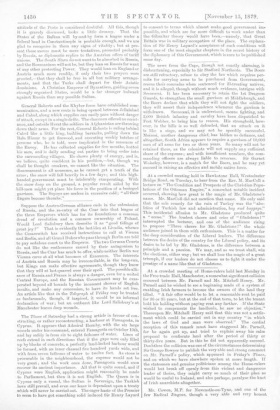Suppose the Austro-German alliance ends in the submission of Russia,
and the re-entry of the Czar into that league of the three Emperors which has for its foundations a common dread of revolution and a common ownership of Poland. Would Lord Salisbury then describe it as "good tidings of great joy ?" That is evidently the last idea at Livadia, whence the Oesarewitch has received instructions to call at Vienna and Berlin, and all Grand Dukes who pass through Berlin are told to pay sedulous court to the Emperor. The two German Courts do not like the restlessness caused by their antagonism to Russia, and the Czar has much to offer, while neither Berlin nor Vienna cares at all what becomes of Erzerouni. The interests of Austria and Russia may be irreconcilable, in the long-run, but Kings can make effective agreements, though they know that they will at last quarrel over their spoil. The possible alli- ance of Russia and France is always a danger, even for a united Central Europe, and the Russian Government may be exas- perated beyond all bounds by the incessant shower of English insults, and make any concession, to have its hands set free. An article like that in the Telegraph of Friday may be treated as fanfaronade, though, if inspired, it would be an informal declaration of war ; but an outburst like Lord Salisbury's at Manchester leaves deep wounds.


































 Previous page
Previous page